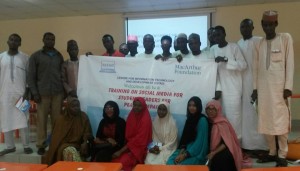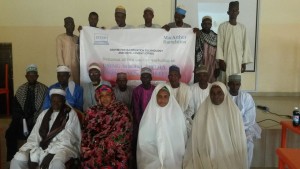
CITAD paid a courtesy visit to Kano State Science and Technical Schools Board.
The Center for Information Technology and Development (CITAD) has paid a courtesy visit to Alhaji Ahmad Tijjani Abdullahi, the Executive Secretary of Science and Technical Schools Board at headquarters of the board situated in Audu Bako Secretariat complex. Making his remark on the purpose of the visit, leader of CITAD team Malam Ahmad Abdullahi Yakasai said the gesture is to further strengthen the existing relationship between CITAD and the board, adding that it is one of the objectives of CITAD to use ICT in empowering citizens as well as bring sustainable development, that is why the organization always goes to schools and communities and carryout ICT trainings and sensitization in order to ensure that this part of the country catch up with others in terms of ICT awareness as well as entrepreneurship.
CITAD has put in place several initiatives aimed at making people to become ICT-wise, eg the yearly ICT quiz for students of secondary schools in Kano and Jigawa states for the past fifteen years (15) which awards different prizes to students, schools and the teachers, that is to sensitize stakeholders on the need to embrace ICT while at the same time encouraging the students to also have passion for IT, another initiative is LATO, an acronym which stands for ‘Learn And Teach Others’, in this programme schools are asked to forward names of teachers that are IT blind to undergo training during holidays hoping they will transfer the knowledge they acquire back to their students and colleagues. CITAD has also last year lunched a computer learning video produced in Hausa language which was tagged ‘ICT4KIDS’, this is to target the younger ones with computer literacy and those who could speak English but are willing to learn computer. We have recently planned to target students of tertiary institutions with apps development competition, the initiatives are many I can only give some examples, said Malam Ahmad.
In his response, the Executive Secretary of Science and Technical Schools Board, Alhaji Ahmad Tijjani Abdullahi said learning is a continuous process and does not end within the four walls of the class room, while curricular activities take place within the four walls of the class room, extracurricular activities take place outside and that is why NGOs like CITAD support schools with a vital knowledge like ICT. The efforts of CITAD helps a lot in extra curricular activities by organizing quiz competition, debate and so on, this is a way of boosting what has been learnt in the classroom, it is a way also of improving the student standard and enabling them to standout in the crowd. Perhaps no one will know their capacity and ability without organizing such events, as well no one would have known the kind of name Dawakin Tofa Science or Dawakin Kudu Science has made without attending and winning the quiz competition organized yearly by CITAD, although it will show in the future when the students have become doctors, engineers, lawyers etc, then they will be seen as products of those schools.
Science and Technical board has come a long way, it was established in 1977 with two secondary schools but the demand and interest have broaden such that the board now has 43 schools. The advanced countries are what they are because of their technological supremacy; therefore knowledge of ICT has become a must. Science and Technical schools board need knowledge of ICT more than all other schools. The board should be the one to pay a courtesy call to CITAD for what it has to offer to the board, but we are grateful that you are concerned and interested to follow us and doll out the much needed support. The board is always willing to benefit from the operations of CITAD especially in the direction of ‘Learn And Teach Others’. The executive secretary concluded by thanking CITAD for the visit, welcoming proposal from CITAD and enjoining the sustenance of cordial and beneficial relationship with the organization.
Present at the courtesy call were the directors of personnel and management, research and statistics, consultancy, educational support, schools, monitoring, and physical planning alongside Ado Shehu Yakasai, Kabiru Sa’idu Dakata, Hauwa Dauda Attah and Hamza Ibrahim, all of Center for Information Technology and Development (CITAD).
The session ended with presentation of some publications of the organization were presented to the Executive Secreatry of the board Alhaji Ahmad Tijjani Abdullahi.

















